Enver Hoxha is the last Stalinist in Europe. Part of 2. The leader of a self-sufficient country
In August, the first cargo ships, trucks, equipment, medicines, food products arrived in Albania from the USSR 1945.
Thus began the cooperation of Albania with the Soviet Union, which lasted more than a decade. According to Enver Hoxha, the path traversed by the Soviet Union was to become a model for Albania. Industrialization and collectivization were considered by the leadership of the Albanian Communists as the most important areas of development of the Albanian state in the postwar period. By the way, in 1948, on the advice of Stalin, the Communist Party of Albania was renamed the Albanian Party of Labor and under this name continued to exist until the collapse of socialism in Eastern Europe. Thus, the first post-war years Albania met, being a loyal ally of the USSR and following in the wake of the foreign policy of the USSR. However, far from all the countries of the "socialist camp" relations in Albania developed cloudlessly.
Conflict with Yugoslavia and the fight against the “Titos”
Almost from the first days of the existence of post-war Albania, relations with neighboring Yugoslavia have seriously deteriorated. Problems in the Albanian-Yugoslav relations were outlined during the Second World War, when Albanian and Yugoslav partisans fought together against the Nazi and Italian occupiers. The disagreements between the Albanian and Yugoslav communists were connected, firstly, with the problem of Kosovo and Metohija - a region populated by both Serbs and Albanians, and secondly - with the long-standing idea of Josip Broz Tito about creating the “Balkan Federation”.
- Proclamation of the Republic. Painting by Fatmir Hajiyu.
The Albanians saw in the “Balkan Federation” the Yugoslavs' desire to dominate and feared that if it was created and Albania joined it, the Albanian population would be in the minority and would be discriminated and assimilated by its Slavic neighbors. Josip Broz Tito and Milovan Djilas tried to persuade Enver Hoxha to accept the idea of the Balkan Confederation, describing the advantages of Albania in the case of integration with Yugoslavia, but Enver Hoxha, being a patriot of sovereign Albania, stubbornly refused the proposals of the Yugoslavs. Relations between Albania and Yugoslavia were rapidly deteriorating, especially since Hoxha reported about Tito’s plans to Moscow and tried to convince Stalin of the danger of Tito and the Titoist line not only for Albania, but also for the whole “socialist camp”.
In accordance with the post-war plans of Soviet and Eastern European communists, a Balkan federal republic should be created on the Balkan Peninsula - a state that would include Yugoslavia, Bulgaria, Romania and Albania. A potential candidate for membership in the Balkan Federation was also Greece, in which in the second half of the 1940s. waged an active partisan struggle by the local communists. In case of victory of the communists, Greece was also proposed to be included in the composition of the Balkan federal republic. It is noteworthy that Joseph Stalin also initially advocated the creation of the Balkan federation, but later he “gave the go-ahead” to create a federation only as part of Yugoslavia, Bulgaria and Albania. On the other hand, Josip Broz Tito opposed the inclusion of Romania and Greece into the federation, as he feared that these relatively politically developed and culturally independent countries could become a counterweight to Yugoslavia, which claims to be a leader in the Balkan federation. Bulgaria and Albania Tito saw the federal republics in the Balkan Federation with the center in Belgrade. Agitating the leadership of the Albanian Communist Party for the inclusion of the country in Yugoslavia, the Titoans justified their proposals for the integration of the economic weakness of the Albanian state, the lack of industry in Albania and the general social and cultural backwardness of the region. Albania, in the event of the implementation of the plan to create the Balkan federation, was waiting for the takeover by Yugoslavia, which many Albanian political leaders could not do, including Enver Hoxha. However, in Albania there was a strong Yugoslav lobby, whose “face” was considered to be Kochi Dzodze (1917-1949) - the Minister of Internal Affairs of Albania and a member of the Central Committee of the Albanian Party of Labor. In addition to him, pro-Yugoslav sentiments were held by such party functionaries as Nuri Huta from the Office of Agitation, Propaganda and the Press, and Pandy Christo from the State Control Commission. With the help of the pro-Yugoslav lobby, Tito and his entourage took every possible step towards the complete subordination of the Albanian economy to the interests of Yugoslavia. According to the Yugoslav model, the armed forces of Albania were reconstructed, which, according to Tito, should have contributed to the speedy subordination of the country to Belgrade. In turn, many Albanian communists, who did not share the pro-Yugoslav positions of Kochi Dzodze and his entourage, were extremely dissatisfied with the policies of neighboring Yugoslavia, since they saw in it expansionist plans for the complete subordination of Albania to Josip Broz Tito. These fears intensified after Yugoslavia began to lobby strongly for the idea of bringing the Yugoslav army division into Albania, ostensibly to protect the borders of Albania from possible attacks from the Greek side.
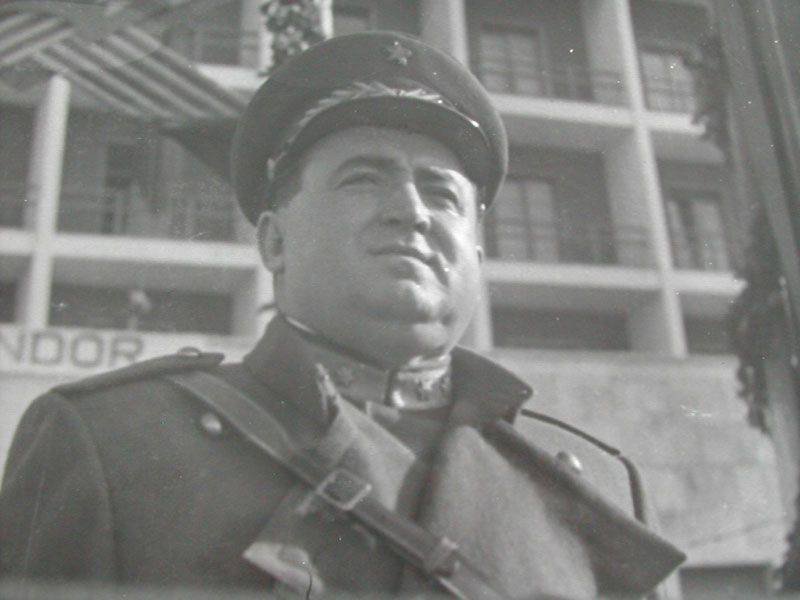
- Kochi Dzodze, founder of the Albanian special services and one of the leaders of the Communist Party
In 1949, the Soviet Union broke off relations with Yugoslavia. This was facilitated by numerous disagreements between the two states, first of all - Tito's growing ambitions, which claimed leadership positions in the Balkans and an independent foreign policy, are not in all cases consistent with the foreign policy of the USSR. In Albania, the dissolution of Soviet-Yugoslav relations was reflected in the further strengthening of the position of Enver Hoxha, who opposed cooperation with Yugoslavia. In the inner-party struggle, the supporters of Hoxha who were guided by the Soviet Union won. At the First Congress of the Albanian Party of Labor, there was an exposure of the activities of the Albanian “Titoites”. Kochi Dzodze and his supporters were arrested; on January 10, 1949 began the investigation of the Titovites' case, which ended with a trial and the death sentence of Kochi Dzodze. After the suppression of the Yugoslav lobby, Enver Hoxha actually took full control of the country. Albania adopted a confident pro-Soviet orientation, in every possible way declaring loyalty to the precepts of Lenin-Stalin. With the help of the Soviet Union, the modernization of the Albanian industry, the strengthening of the army and state security agencies continued. Albania joined the Council for Mutual Economic Assistance, received a loan for the purchase of Soviet products. With the help of the Soviet Union, an autotractor factory was built in Tirana. In accordance with the Soviet Union’s foreign policy to harshly criticize the regime of Tito, which was characterized by nothing less than fascist and policeman, in Albania, persecution of party members and government officials suspected of sympathizing with the Yugoslav leader and the Yugoslav model of socialism began. The political regime in the country has tightened, as Enver Hoxha and his closest associate Mehmet Shehu were extremely concerned about the possible manifestations of subversive activities by the Yugoslav special services.
In the first post-war decade, the economic development of Albania was carried out at a rapid pace — largely, with the support of the Soviet Union. The tasks of modernizing the Albanian economy were complicated by the extreme backwardness of the Albanian society, which until the victory of the Communists in the country was, in fact, feudal in nature. The small number of the proletariat did not allow to form from its worthy representatives the cadre composition of party leadership, therefore people from wealthy sections of Albanian society, who received a good European education in the pre-war period, primarily in France, still stood at the helm of the Albanian Party of Labor. The first five-year plan for the development of the Albanian economy was developed with the participation of specialists from the Soviet Gosplan. Moreover, in fact, Soviet scientists became the authors of the program for the development of the Albanian economy. Enver Hoxha and Joseph Stalin personally approved the plan. In accordance with the five-year plan, Albania expected the collectivization of agriculture and the massive development of industry, primarily the construction of power plants to provide the country with electricity. In Tirana, plants were built on the model of ZIS and ZIM, with the help of the Soviet Union developed railway construction in the country. In addition to the Soviet Union, at the beginning of the 1950's. Albania develops relations with the German Democratic Republic, North Vietnam and China. Subsequently, it is relations with China that will play a crucial role in the development of Albania during the cold war era. Enver Hoxha became a frequent guest in the Soviet Union, earning the sympathy and trust of Stalin.
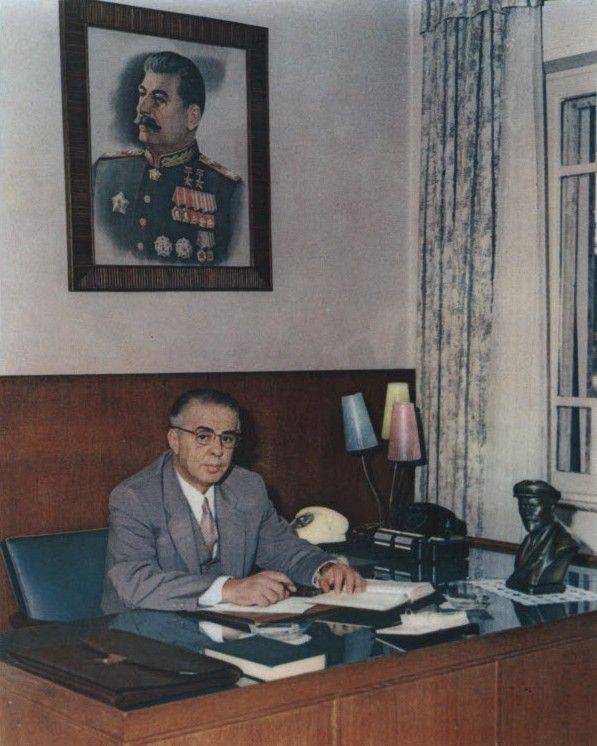
When Joseph Vissarionovich Stalin died in March 1953, Enver Hoxha, shocked by this news, began to consider the further consequences of the death of the Soviet leader for the Albanian state. He reasonably treated with some degree of distrust towards many people from Stalin’s closest circle. As it turned out - not in vain. The death of Stalin entailed cardinal changes in the domestic and foreign policy of the Soviet Union, reflecting on Soviet-Albanian relations. Like the Chinese leader Mao Zedong, Enver Hoxha did not go to Moscow for the funeral of I.V. Stalin, fearing a possible attempt on his life. In the death of the Soviet leader, Khoja saw the intrigues of the anti-Stalinists in the leadership of the CPSU and believed that for the sake of further de-Stalinization of the socialist camp, Stalin's opponents in the Soviet leadership could physically eliminate such staunch Stalinists like him or how Mao Zedong.
The de-Stalinization of the USSR and the deterioration of Soviet-Albanian relations
At first, Soviet-Albanian relations, as it seemed, continued to evolve along the groove. The USSR provided economic and technical assistance to Albania, officially called it a fraternal country. However, in reality, the tension between the two states was growing and the outcome, with the inevitable rupture of bilateral relations, was approaching. In fact, the 20th congress of the Communist Party of the Soviet Union was the starting point in the subsequent Soviet-Albanian confrontation, at which the new leader of the Soviet Communist Party, Nikita Sergeevich Khrushchev, spoke on the Stalin personality cult. This report meant the transition of the Soviet leadership to the policy of de-Stalinization, which was perceived by the leaders of some states of the "socialist camp" as a betrayal of the ideals of Lenin-Stalin and the turn of the Soviet Union to the "reactionary" path. In protest against the anti-Stalinist speech of Khrushchev, representing China Zhou Enlai and representing Albania, Enver Hoxha pointedly left the venue of the congress, not waiting for its official closure. In the same 1956, the Third Congress of the Albanian Party of Labor was held, at which criticism was heard against Enver Hoxha and Mehmet Shehu. Apparently, the speeches of some Albanian Communists were staged in Moscow and set as their goal the “de-Stalinization” of Albania along the lines of the Soviet Union. But, unlike the USSR, in Albania, the critic of the "personality cult" Enver Hoxha failed. And, first of all, because the ordinary masses of the poor peasant population of the country remembered Hoxha as a partisan commander, treated him with great respect, and the pro-Soviet and pro-Yugoslav sentiments spread only among the few party intelligentsia. After the Third APT Congress, cleansing of “reactionaries” took place in the country, as a result of which hundreds of people were arrested - members of the Albanian Labor Party and non-partisans. Albania abandoned the Soviet course of de-Stalinization and proclaimed loyalty to the principles of Stalin, as proof of which Enver Hoxha even established the Order of Stalin.
In Moscow, the behavior of the Albanian leadership caused a sharply negative reaction. After all, the presence of open supporters of Stalinism in the international communist movement, and even those represented at the state level, rather than marginal groups, called into question the ideological correctness and adequacy of the Soviet leadership and the Soviet Communist Party as a whole. Moreover, China remained in the Stalinist positions - the most powerful, after the USSR, the state of the “socialist camp”. Between China and Albania from the second half of the 1950's. bilateral relations began to develop, the strengthening of which coincided with the gradual dissolution of Soviet-Albanian ties. In 1959, Nikita Khrushchev made a trip to Albania, during which he tried to persuade Enver Hoxha and other communist leaders to abandon Stalinism and support the CPSU line. But Khrushchev's persuasion and even the threat to deprive Albania of economic support from the Soviet Union did not affect the leaders of the Albanian Party of Labor (especially since Albania expected economic aid from China). Khoja refused the offer of Khrushchev. Albania and the Soviet Union entered a phase of open ideological confrontation.
Speech by Enver Hoxha in Moscow at a meeting of the Communist Parties. 1960 year.
In 1962, Albania withdrew from the Council for Mutual Economic Assistance, and next year officially “threw” the Soviet Union, declaring that it was not going to return to Moscow those recruited during the years in power of I.V. Stalin's debts. The loss of Albania turned out to be serious economic, military-political and image problems for the Soviet Union. Firstly, the USSR lost its influence on the second socialist country in the Balkans (Yugoslavia fell out of the USSR's influence as early as the 1940s). Secondly, after the break in the Soviet-Albanian relations, Albania refused to maintain a Soviet naval base on its territory, which deprived the USSR Navy of its strategic positions in the Adriatic Sea. Recall that in 1958, in the city of Vlora, a Soviet naval base was deployed, which housed a separate submarine brigade, as well as auxiliary and anti-submarine units. After a sharp deterioration in relations between the USSR and Albania in 1961, the Soviet navy was withdrawn from the country. Third, Enver Hoxha’s demonstrative loyalty to Stalin’s ideas, accompanied by sharp criticism of the Soviet Union for “reconciliation” with the capitalist world, added to the Albanian leader popularity among the radical part of the world communist movement and even among the part of Soviet citizens skeptical of Khrushchev and his anti-Stalinist policy. “Long live the Leninist government without the talker and traitor Khrushchev. The politics of the madman led to the loss of China, Albania and millions of our former friends. The country is at an impasse. Rallied ranks. Save the Motherland! ”- such leaflets, in 1962, for example, were distributed in Kiev by Communist Party member 45-year-old Boris Loskutov, chairman of a collective farm. That is, we see that among Soviet citizens the loss of Albania was perceived as the result of the political stupidity of Nikita Khrushchev or his overt hostility to the ideas of Lenin-Stalin. In October, 1961 was held the XXII Congress of the CPSU, at which Nikita Khrushchev sharply criticized the policy of the Albanian Party of Labor. In December, 1961 Albania broke off diplomatic relations with the Soviet Union. Since then, and for thirty years, Albania has existed outside the field of Soviet political influence.
From union with China to isolation
The place of the Soviet Union in the system of foreign policy and foreign economic relations of Albania was quickly occupied by China. Albania and the People’s Republic of China were brought closer, first of all, by their attitude to the role of the personality of I.V. Stalin in the world communist movement. Unlike most Eastern European countries that supported the USSR’s line of de-Stalinization of the communist movement, China, like Albania, did not agree with Khrushchev’s criticism of Stalin’s personality cult. Gradually, two centers of gravity were formed in the communist movement - the USSR and China. The more radical communist parties, factions and groups that did not want to move away from the Stalinist course and, moreover, follow the Soviet line for peaceful relations with the capitalist West, towards China. When the Soviet Union, having cut off ties with Albania, stopped supplying the country with food, medicine, machinery and equipment, China took over the delivery of 90% of the goods promised to Tirana by Moscow. At the same time, the PRC extended large financial loans to Tirana on more favorable terms. In turn, Albania supported the political course of the PRC and turned into a “European mouthpiece” of the Maoist foreign policy. It is Albania from 1962 to 1972. represented the interests of the People’s Republic of China at the United Nations. On a number of important issues of international policy, the PRC and Albania had similar positions, which also contributed to the development of bilateral economic ties. However, as Sino-Albanian relations strengthened, it turned out that specialists arriving from China were significantly inferior to Soviet specialists in terms of knowledge and qualifications, but due to broken relations with the Soviet Union, Albania could not do anything - the economy and defense of the country had to be content with the help of Chinese advisors and equipment supplied from China.
- "The flesh of the flesh of its people." Painting Zefa Shoshi.
In 1960 - 1980 - s. in Albania, the political regime was finally consolidated, opposing itself to both the capitalist countries of the West and the “socialist camp” under the leadership of the USSR. In 1968, after the invasion of the USSR into Czechoslovakia, Albania withdrew from the Warsaw Pact Organization, thereby finally dissociating itself even in military-political terms from the countries of the "socialist camp" of Eastern Europe. Not everything went smoothly in the Albanian-Chinese relations. When China, well aware of the need to further strengthen its economy, possible only through the development of foreign relations with other countries, including capitalist ones, gradually shifted to liberalizing relations with Western countries, Albania spoiled relations with the PRC. The volume of foreign trade between the two countries was sharply reduced. In fact, the only full-fledged partner of Albania in the communist camp, after the break with China, remained Romania. Although Romania was a member of the Council for Mutual Economic Assistance and the Warsaw Pact, the Romanian leader Nicolae Ceausescu adhered to an independent foreign policy line and could afford to be friends with “disgraced” Albania. In turn, Albania saw in Romania a legitimate ally - the only non-Slavic socialist state in the Balkans. At the same time, Albania also maintained trade relations with a number of other socialist states of Eastern Europe, including Hungary and Czechoslovakia. The only thing from which Albania sought to distance itself as much as possible was the development of trade relations with the United States and the capitalist countries of Europe. The exception was France, because Enver Hoxha was quite positive about the figure of General Charles de Gaulle. In addition, Albania provided tangible support to numerous Stalinist parties and groups in all countries of the world - from Turkey and Ethiopia to the countries of the “socialist camp”, where Stalinist groups also opposed the official pro-Soviet line. A number of national liberation movements in the third world countries also enjoyed the support of Albania.
- Land Reform. Receipt of documents on the ground. Painting Guri Madi.
Khojaism - Albanian version of “Juche”
During the post-war decades in Albania itself, the authority and authority of the leader of the Albanian Labor Party, Enver Hoxha, was strengthened. He still remained a fiery supporter of the ideas of Lenin - Stalin, having formulated his own ideological doctrine, which received the name "Hoxhaism" in political science. Khojaism has common features with the North Korean ideology of Juche, consisting primarily in the pursuit of self-sufficiency and a certain isolationism. For a long time, Albania remained the most closed country in Europe, which did not prevent Enver Hoxha and his associates from carrying out a sufficiently effective communist experiment on its territory. The model of a political leader who cares about his people, Enver Hoxha, considered Joseph Stalin, and the Soviet Union under the leadership of Stalin was an ideal form of government. In Albania, unlike other socialist countries of Eastern Europe, monuments to Stalin, geographical names and streets named after Stalin were kept, the anniversary of the October revolution, birthdays and deaths of Vladimir Ilyich Lenin and Joseph Vissarionovich Stalin were officially celebrated. In the name of Stalin was named Kuchova - one of the relatively large Albanian cities. Albania played an important role in the system of international propaganda of Stalinism - it was in Albania that extensive propaganda literature was published, as well as Stalin’s writings, the latter being published, including in Russian. The isolationism policy pursued by Hoxha was determined by the military-mobilization nature of Albanian society in the 1960-1980-s. Having found itself practically in complete isolation, Albania set about building socialism with its own forces, at the same time increasing its defense potential and improving the system of state security. From the Soviet Union of the thirties, Albania borrowed the policy of regular "purges" of the party and state apparatus, the fight against revisionism.
It is known that Albania is a multi-confessional state. Here Muslims historically live - Sunnis, Muslims - Shiites, Christians - Catholics and Orthodox. There have never been serious conflicts on the basis of interfaith relations in Albania, but during the years of Enver Hoxha’s rule, the course was set for the complete secularization of Albanian society. Albania became the first and only state in the world, officially proclaimed "atheistic". Formally, all Albanians were recognized as atheists, there was an intensified struggle against any manifestations of religiosity. All property and all buildings of religious institutions, whether mosques, churches or monasteries, were confiscated by the state and transferred to the needs of the social and economic infrastructure. Attempts by citizens to baptize their children or to perform wedding ceremonies according to Christian or Muslim customs were severely punished, including the death penalty for violators of anti-religious prohibitions. As a result of the atheistic upbringing in Albania, generations of citizens of the country managed to grow up, not professing any of the traditional religions for the Albanian people. In religion, Enver Hoxha saw a rival for the communist ideology, which, during his rule, permeated all spheres of life in Albanian society. Of great interest is the socio-economic policy of Enver Hoxha, which, despite some shortcomings and excesses, was carried out in the interests of the working people of the Albanian population. Thus, in accordance with the Khojaist doctrine, in a socialist country, representatives of the communist party and state employees cannot have privileges distinguishing them from the general environment of the workers, peasants and the labor intelligentsia. Therefore, Enver Hoxha decided to permanently reduce the wages of party and state workers. Due to the constantly decreasing salary of officials, there was an increase in pensions, social payments, wages of workers and employees. Back in 1960, income tax was abolished in Albania, prices for a whole range of goods and services decreased annually. So, by the end of 1980's. the average Albanian worker or employee, receiving approximately 730 - 750 leks, paid for an apartment 10-15 leks. Workers with experience of more than 15 years received the right to annual paid vouchers to resorts, preferential payment of drugs. All workers, pupils and students were provided with free meals at the place of work or study.
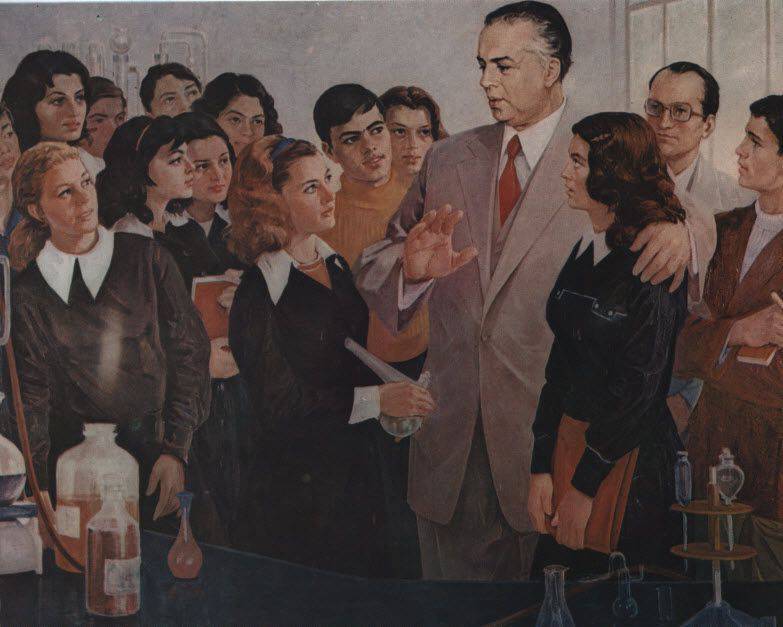
- Enver Hoxha and student youth
The unconditional gains of the Albanian people during the years of Enver Hoxha's rule include, first of all, the elimination of illiteracy. Back at the beginning of the 1950's. the overwhelming majority of Albanians were illiterate, as their childhood and youth passed in a terrible war era or in pre-war royal Albania. By the end of 1970, by the efforts of the Albanian Communists, illiteracy in the country was completely eliminated. School textbooks and school uniforms in socialist Albania were free of charge, which greatly facilitated the budgets of families raising school-age children. In addition, it was in socialist Albania that for the first time it was possible to raise the birth rate to the highest level in Europe - 33 people per thousand, and mortality - to the level 6 people per thousand. Thus, the Albanian nation, before, by virtue of its backwardness, virtually extinct, received an incentive to develop. By the way, in the event of the death of one of the spouses, the remaining family members were paid monthly salary or pension of the deceased, which was supposed to help them “get on their feet” and recover after the relative’s departure. Measures to stimulate fertility and had a material component. So, a woman who gave birth to her first child received 10% wage increase, the second - 15%. Paid leave for birth and child care was two years. At the same time, there were certain restrictions - the Albanian could not have a private car or a grand piano, a VCR or a non-standard cottage, listen to Western radio and music and rent out their living space to outsiders.
In 1976, Albania passed a law banning foreign credits and loans, which was explained by the completion of the construction of a self-sufficiently closed economic system. By 1976, Albania was able to create such a business model that allowed it to fully meet the country's needs for food, industrial equipment and medicines. It is significant that quite recently the former extremely backward, Albania began to export some manufactured goods to the countries of the “third world”. From time to time political cleansing took place in the country, as a result of which members of the party and state leadership were removed, who did not agree with any nuances of Hoxha’s political course. So, December 17 1981. Mecmet Shekha died under mysterious circumstances. In the Albanian Party of Labor and in the Albanian state, Mehmet Shehu (1913-1981) took very serious positions - he was considered the second most important political figure of the country after Enver Hoxha.
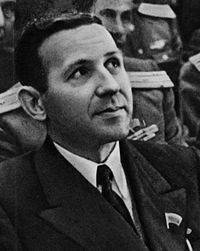 Even in the pre-war period, Shehu received a military education in Italy, then participated in the Spanish Civil War as part of the brigade named after J. Garibaldi. During the Second World War, Mehmet Shehu commanded a partisan division, then became the chief of the general staff of the armed forces and rose to the rank of army general. It was Mehmet Shehu who led the purge against the Titovites and Khrushchevites, and since 1974 he served as Minister of National Defense. However, in 1981, disputes began between Khoja and Shehu on the question of further ways of development of Albania. As a result, on December 17, 1981, Shehu died, allegedly committing suicide after being exposed as a Yugoslav spy. But there is another version - Mehmet Shehu, once the closest person to Enver Hoxha, was shot dead right at a meeting of the Central Committee of the Albanian Labor Party. Relatives of Mehmet Shehu were arrested. It is likely that in the early 1980s. supporters of liberalization of relations with China and even with the USSR appeared in the Albanian leadership. However, Enver Hoxha, who remained faithful to the Stalinist ideals, did not want to make concessions and preferred to use the old and tried-and-tested method in the battles for power - party purges.
Even in the pre-war period, Shehu received a military education in Italy, then participated in the Spanish Civil War as part of the brigade named after J. Garibaldi. During the Second World War, Mehmet Shehu commanded a partisan division, then became the chief of the general staff of the armed forces and rose to the rank of army general. It was Mehmet Shehu who led the purge against the Titovites and Khrushchevites, and since 1974 he served as Minister of National Defense. However, in 1981, disputes began between Khoja and Shehu on the question of further ways of development of Albania. As a result, on December 17, 1981, Shehu died, allegedly committing suicide after being exposed as a Yugoslav spy. But there is another version - Mehmet Shehu, once the closest person to Enver Hoxha, was shot dead right at a meeting of the Central Committee of the Albanian Labor Party. Relatives of Mehmet Shehu were arrested. It is likely that in the early 1980s. supporters of liberalization of relations with China and even with the USSR appeared in the Albanian leadership. However, Enver Hoxha, who remained faithful to the Stalinist ideals, did not want to make concessions and preferred to use the old and tried-and-tested method in the battles for power - party purges. The collapse of the last Stalinist fortress of Europe
However, despite the ideological inflexibility, physically Enver Hoxha, who by the beginning of the 1980-ies. passed over seventy, was not the same. By 1983, his health had deteriorated significantly, in particular, diabetes, which provoked a heart attack and stroke, worsened. In fact, Enver Hoxha in 1983-1985. gradually moved away from the real leadership of Albania, transferring most of his duties to Ramiz Alia. Ramiz Aliya (1925-2011) was a member of the younger generation of the old communist guards of Albania. He had the opportunity to participate in the partisan movement as a political worker, and then as a commissioner of the 5 division. In 1949-1955, Ramiz Aliya headed the Union of Albanian Labor Youth, in 1948 he became a member of the Central Committee of the Albanian Party of Labor, and in 1960 he became secretary of the Central Committee of the Albanian Party of Labor. Like Hodge, Ramiz Aliya was a supporter of the policy of "self-reliance", which explained the sympathy for him from the Albanian leader. Not surprisingly, it was Ramiz Aliy who was predicted to succeed Enver Hoxha in the event of the death of the leader of communist Albania.
In March, 1985 came to power in the Soviet Union, came Mikhail Gorbachev, embarked on a policy of "restructuring". A month after Gorbachev led the Soviet Union, on the night of April 11 1985, as a result of hemorrhage in the brain, the long-term leader of the Albanian Party of Labor and the Albanian state 76-year-old Enver Khalil Khoja died in Albania.
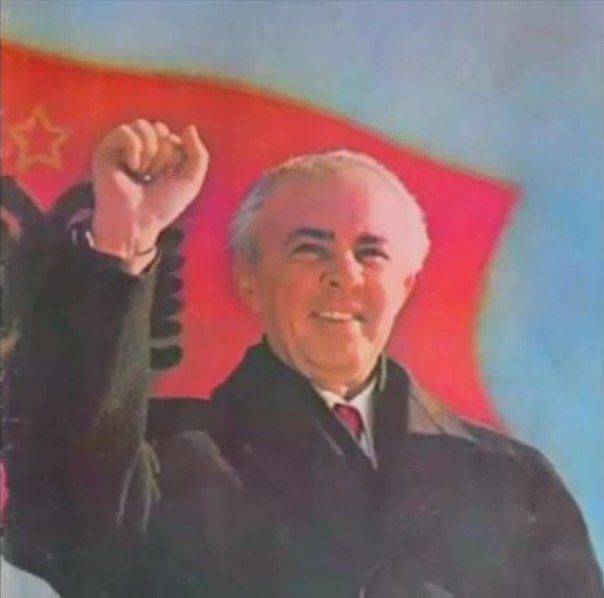
Nine-day mourning was declared in the country, during which the most trusted foreign guests arrived at the funeral of the leader of the Albanian Labor Party - representatives of the leadership of the communist parties of the DPRK, Vietnam, Laos, Kampuchea, Romania, Cuba, Nicaragua, South Yemen, Iran and Iraq. The Albanian leadership sent telegrams with condolences from the USSR, the PRC and Yugoslavia sent back, accepting only the condolences of Fidel Castro, Nicolae Ceausescu and Kim Il Sung. 13 April 1985 was elected Ramiz Alia as the first secretary of the Central Committee of the Albanian Party of Labor. Once at the head of the Albanian state, he began some liberalization of political life in the country, although he retained strict censorship in the media. Aliya undertook two large-scale amnesties for political prisoners - in 1986 and 1989, stopped the practice of mass cleansing, and also began to establish foreign economic relations with Greece, Yugoslavia, Turkey and Italy. Against the background of the processes of dismantling of the socialist regimes taking place in the world, the political situation in Albania sharply destabilized.
In December, 1990 was a mass student demonstration in the capital. In 1991, the opposition Democratic Party of Albania appeared in the northern part of the country, and 3 on April 1992 in Ramiz Alia, who lost actual control over the situation in the country, was forced to resign. In August, 1992 was placed under house arrest. In 1994, the last Communist leader of Albania was sentenced to 9 years in prison, but in 1996 he managed to escape to the United Arab Emirates, where he periodically visited Albania (after the end of the criminal prosecution), and spent the remaining years, having died in 2011 Despite the fact that in Albania, the communist regime is a long time ago, and the ideas and activities of Enver Hoxha’s attitude in society varies from sharply negative to approving, the political legacy of the Albanian revolutionary um his followers in various countries around the world.
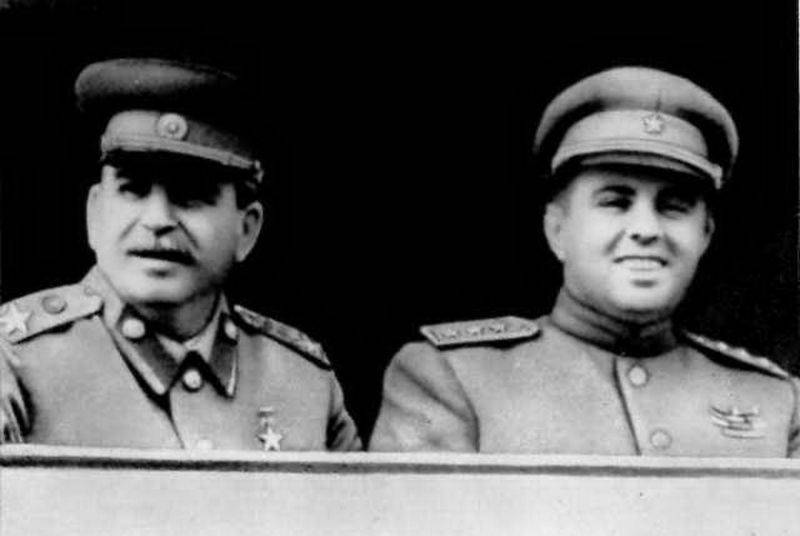
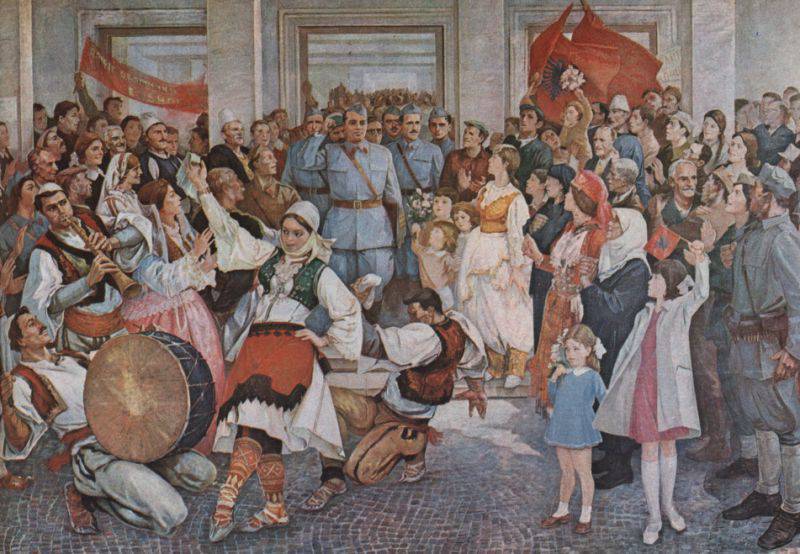
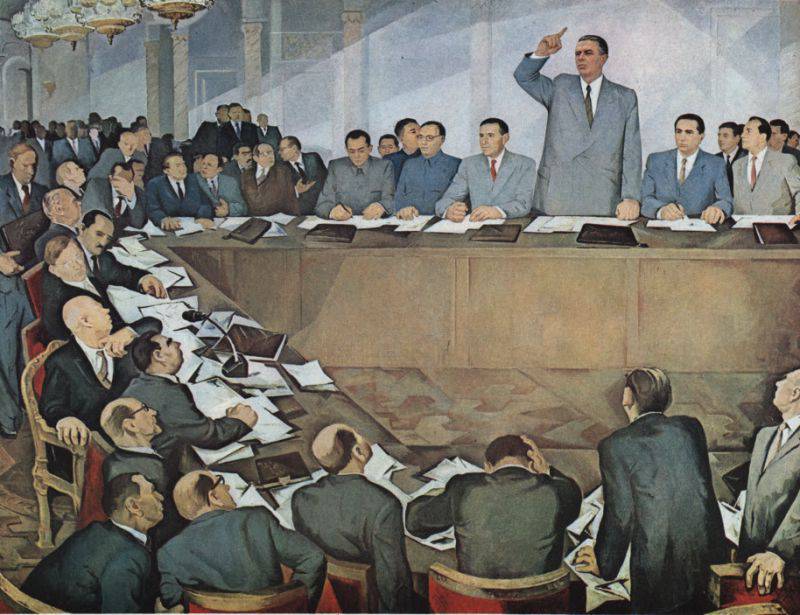
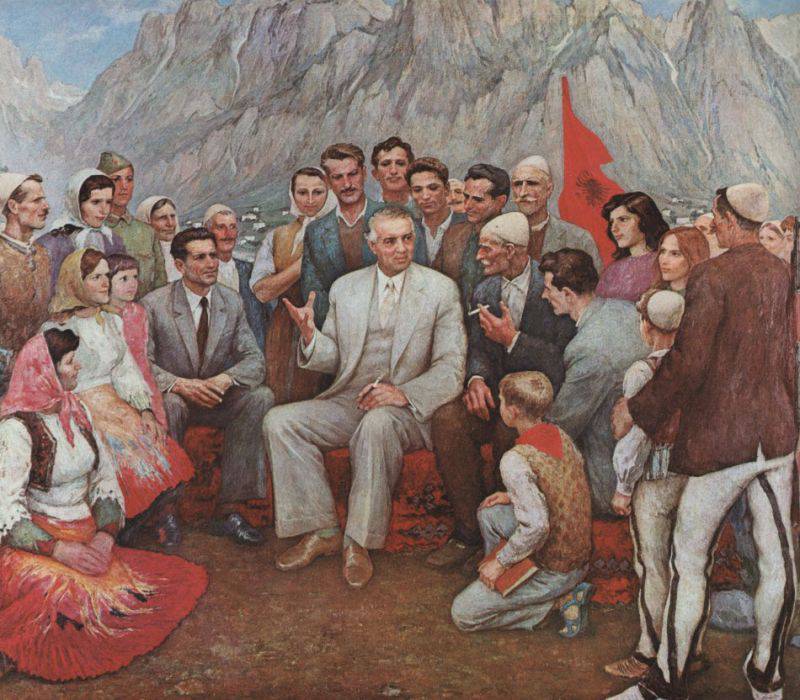
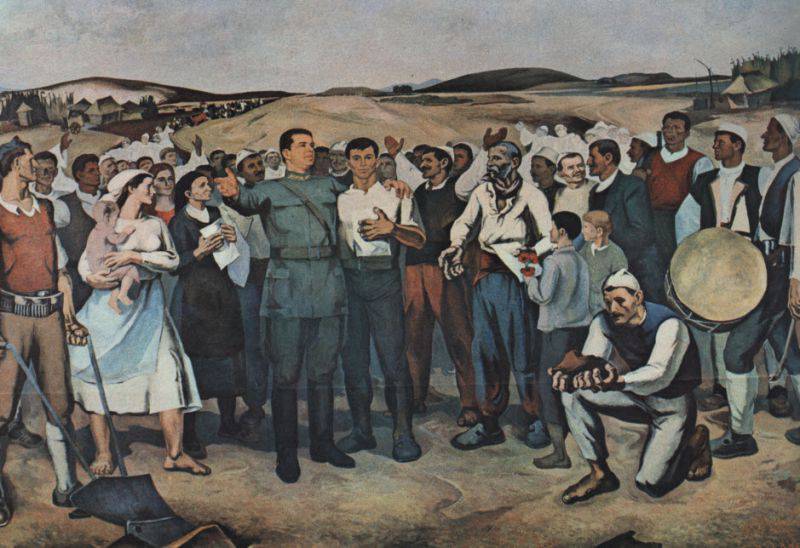
Information